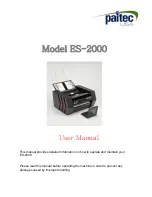
User Manual
RPC-TNC Calibration Kit
06CK001-150 and 06CK010-150
06CK001-150
Rosenberger Hochfrequenztechnik GmbH & Co. KG
P.O.Box 1260 D-84526 Tittmoning Germany
www.rosenberger.com
Tel. : +49 8684 18-0
Email : [email protected]
Page
16 / 18
D
ie
se
s
D
ok
um
e
nt
is
t
ur
h
e
be
rr
ec
h
tli
ch
g
es
ch
üt
zt
●
T
h
is
d
o
cu
m
e
nt
is
p
ro
te
ct
e
d
b
y
co
py
rig
h
t
●
R
os
en
b
er
ge
r
H
o
ch
fr
eq
ue
n
zt
ec
hn
ik
G
m
b
H
&
C
o.
K
G
6.3 Mechanical Specifications
Good electrical microwave connections need well-defined mechanical connector dimensions. Pin
depth and excentricity of the center conductor have a significant impact on the electrical
performance.
Pin depth is the distance the centre conductor mating plane differs from being flush with the outer
conductor mating plane (see Figure 6-3). The pin depth of a connector can be in one of two states:
either protruding or recessed.
Protrusion is the condition in which the centre conductor extends beyond the outer conductor
mating plane. This may result in buckling of the socket contacts or damage to the internal structure
of a device due to the axial forces generated.
NOTE:
At no time should the pin depth of the connector be protruding.
Recession is the condition in which the centre conductor is set back from the outer conductor
mating plane. The amount of unwanted reflections is directly proportional to the pin depth.
Pin depth limits are defined for all calibration standards in the specific data sheets.
Figure 6-3 Connector Pin Depth
6.4 Handling and Storage
Install the protective end caps and store the calibration devices in the foam-lined storage case
when not in use.
Never store connectors loose in a box, or in a desk or bench drawer. This is the most common
cause of connector damage during storage.
Keep connectors clean.
Do not touch mating plane surfaces. Natural skin oils and microscopic particles of dirt are easily
transferred to a connector interface and are very difficult to remove.



































